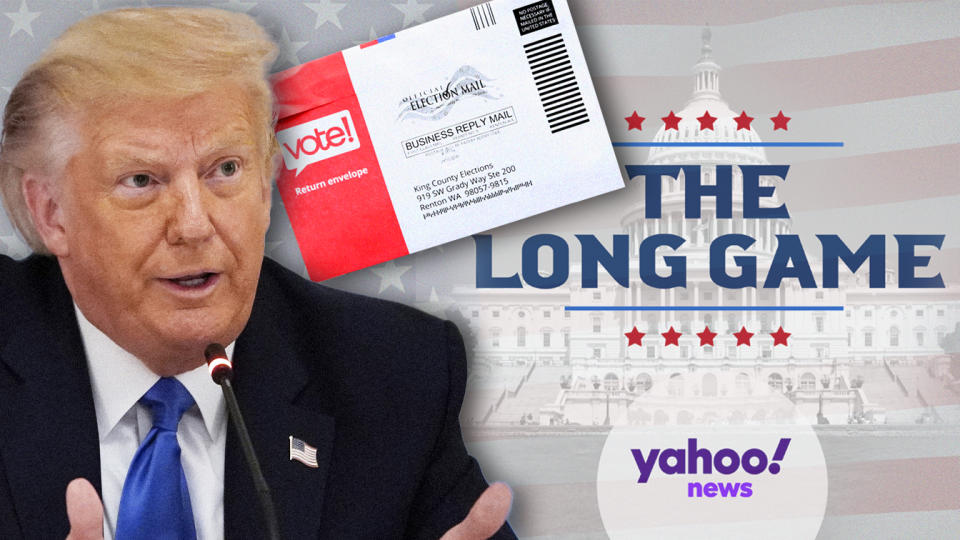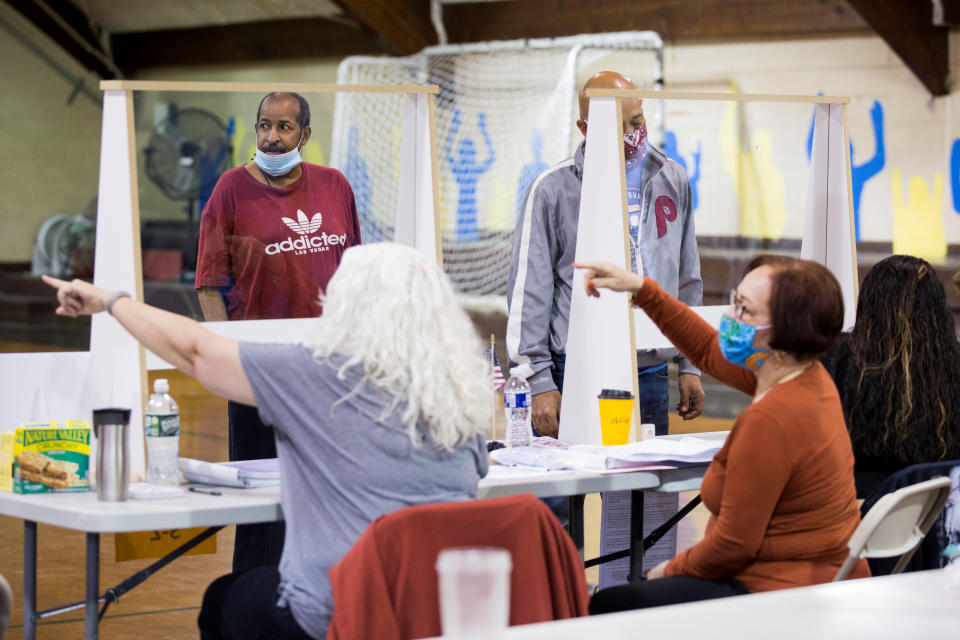Trump's attacks on mail-in voting could lead to nightmare scenario, election expert warns
WASHINGTON — Anyone can spin out a worst-case scenario for the presidential election, but it’s worth paying particular attention to those that keep experts like Richard Hasen up at night.
Hasen, a law and political science professor at the University of California, Irvine, has written multiple books on elections, including one that was released just before the COVID-19 pandemic, “Election Meltdown.”
Even before the pandemic made it likely that there will be a historic number of mail-in ballots in this fall’s election, Hasen was worried that if the election were close, President Trump might declare victory before all the votes were counted.

That concern is now much greater for Hasen. Since the emergence of the coronavirus, Trump has made numerous wild claims — without any evidence and in contradiction to known facts — that mail-in voting will lead to widespread fraud and cheating.
If most Republicans vote in person and most Democrats vote by mail, Hasen said, that could create a scenario well suited to Trump’s tendency to make unfounded accusations of wrongdoing.
“As Trump drives more and more of his supporters to vote in person and away from vote-by-mail, it’s quite likely that we’ll see Trump getting many more votes on election night, the votes that are counted on Election Day,” Hasen said in an interview on “The Long Game,” a Yahoo News podcast.
“Then, four or five days later, [if] Biden becomes the winner as the absentee ballots are counted in Philadelphia or Detroit, that’s a recipe, if it’s close, for a really ugly election scenario,” he said.
Hasen pinpointed Philadelphia and Detroit in particular because they are both big cities in swing states that decided the 2016 election, and both cities have a track record of what Hasen calls “electoral incompetence” in his book.
“There’s a history of terrible election administration in Detroit,” he said. “There’s a history of bad election administration in Philadelphia.”
Election results in Philadelphia this year for the June 2 primary were not certified for nearly three weeks. And to confirm Hasen’s concern about a partisan breakdown over mail-in voting, more than a million Democrats cast a ballot by mail in Pennsylvania’s primary, compared with only about 400,000 Republicans, according to data provided to Yahoo News by the Pennsylvania Department of State.
“There’s going to be many, many, many more people voting in November than voted in these primaries,” Hasen said.

He said one of the keys to inoculating the country against claims of a stolen election is to prepare people for the possibility that if the election is close, it could take a week or more for the results to be decided.
In addition, he said, unless the results clearly indicate a landslide victory for Trump or Democrat Joe Biden, the media should avoid any kind of projections or calls of who has won.
In Michigan, Hasen said, Secretary of State Jocelyn Benson, a Democrat, has argued that the state should pass a law allowing election officials to process mail-in ballots as they arrive in the days and weeks leading up to Election Day.
That would allow Michigan to conduct election security measures, such as checking signatures on mail-in ballots against signatures on file with the state, at a more deliberate and less hurried pace. Then, after Election Day, the ballots could be processed again to see what the results were.
But, Hasen said, Republicans who control the Michigan Legislature have resisted Benson’s calls for this reform, despite the fact that it would increase security and decrease the likelihood of any ballots being cast fraudulently.
Hasen is widely acknowledged as one of the most evenhanded experts on the issue of voting, and is willing to critique both Democrats and Republicans. On the issue of fraud, he told Yahoo News that Republicans have “overplayed their hand” over the last 20 years by talking about “voter impersonation” as a way of justifying voter ID laws, even though “that fraud is practically nonexistent.”
But he also said that “if you look at voter ID laws … which got the most attention the last decade, I think that in terms of voter turnout and things like that, they don’t have a large effect, from what we can see.” In other words, regardless of the intentions of lawmakers who push for voter ID laws, Hasen says there’s scant evidence that these policies have helped Republicans win many elections.
However, he has called out the most prominent proponents of voter ID laws, such as former Kansas Secretary of State Kris Kobach and the Heritage Foundation’s Hans von Spakovsky, as “hucksters” and refers to Kobach as a “vote suppressor” in his book. He devotes a lengthy section of the book to the 2018 court proceeding in which Kobach and von Spakovsky’s claims of widespread voter fraud did not stand up to scrutiny.

Hasen also does not dismiss the need for keeping voter rolls up to date, which some critics call “purging” the rolls. Yet he also says that if the rolls are maintained in a malicious or incompetent way, that can amount to voter suppression.
Still, in his book, Hasen cautions Democrats against claiming that voter suppression changes the outcome of an election unless there is clear proof.
“The right question is why the state gets to put stumbling blocks in front of voters — such as onerous registration requirements and easy voter purge rules — without offering good reasons for doing so,” he writes. “By focusing on the dignity and respect afforded to each voter, we can push to maximize the number of eligible voters who are able to cast a ballot that will count, regardless of election outcomes.”
Hasen wrote a piece in 2018 arguing that Democrats should not call the gubernatorial election that year in Georgia “stolen,” as prominent Democrats like Ohio Sen. Sherrod Brown did. The Democratic candidate, Stacey Abrams, gave a carefully worded speech after the election in which she said that “I cannot concede,” but also that “I acknowledge that [Republican] Brian Kemp will be certified as the victor.”
“Saying Kemp suppressed or tried to suppress Democratic votes and saying the election was ‘stolen’ are two different things, and when Democrats raise charges of a stolen election that cannot be proved, they undermine their complaints about suppressive tactics,” Hasen writes in “Election Meltdown.”
Hasen told Yahoo News that he was “not trying to equalize the blame between Brian Kemp, who is awful, and Stacey Abrams, who I think has done a lot of great things for voting rights.” He argued that Kemp — who oversaw the gubernatorial election as Georgia’s secretary of state — “did some horrible things in how he ran his election” and pointed out that he discusses what he describes as Kemp’s suppressive tactics in his book.

Abrams told Yahoo News in 2019 that she did “struggle” with how to respond to the 2018 election because of her belief in democratic institutions.
“Yes, there has to be finality in an election, and under the laws of Georgia I could not reasonably leverage the laws to change the outcome, and I didn’t think I should,” she said. “I acknowledged the legal sufficiency of the outcome. But I challenged the laws themselves because the laws permitted Brian Kemp to manage his own election, to strip people of their rights and to thwart democracy.”
On mail-in voting, Hasen said that it’s “pretty much correct” to call voter fraud a “myth” when it comes to voter impersonation, but that “it doesn’t mean that election crimes and voter fraud never happen.”
And while mail-in voting produces about a quarter of all fraud complaints, he said, “most of those cases don’t involve schemes to steal an election.”
“They involve a person stealing a single ballot, or somebody requesting an absentee ballot for someone else, or Mom voting Junior’s ballot,” he said.
In fact, Hasen said, “you’d have to go back to the 1960s to find significant fraud on a large scale.”
“Yes, there are occasional elections where, especially in small jurisdictions, where nonsense goes on,” he said. “But I think since the 1960s, we can say that American elections have been very clean.”
That’s all the more reason why Trump’s many baseless accusations of voter fraud, both in 2016 and ahead of the 2020 election, worry Hasen so much.
“Rhetoric about stolen elections feeds a growing cycle of mistrust and delegitimization of the election process,” Hasen wrote in 2018. “A democratic polity depends on losers accepting election results, even if the election was not conducted perfectly.”
_____
Read more from Yahoo News:



